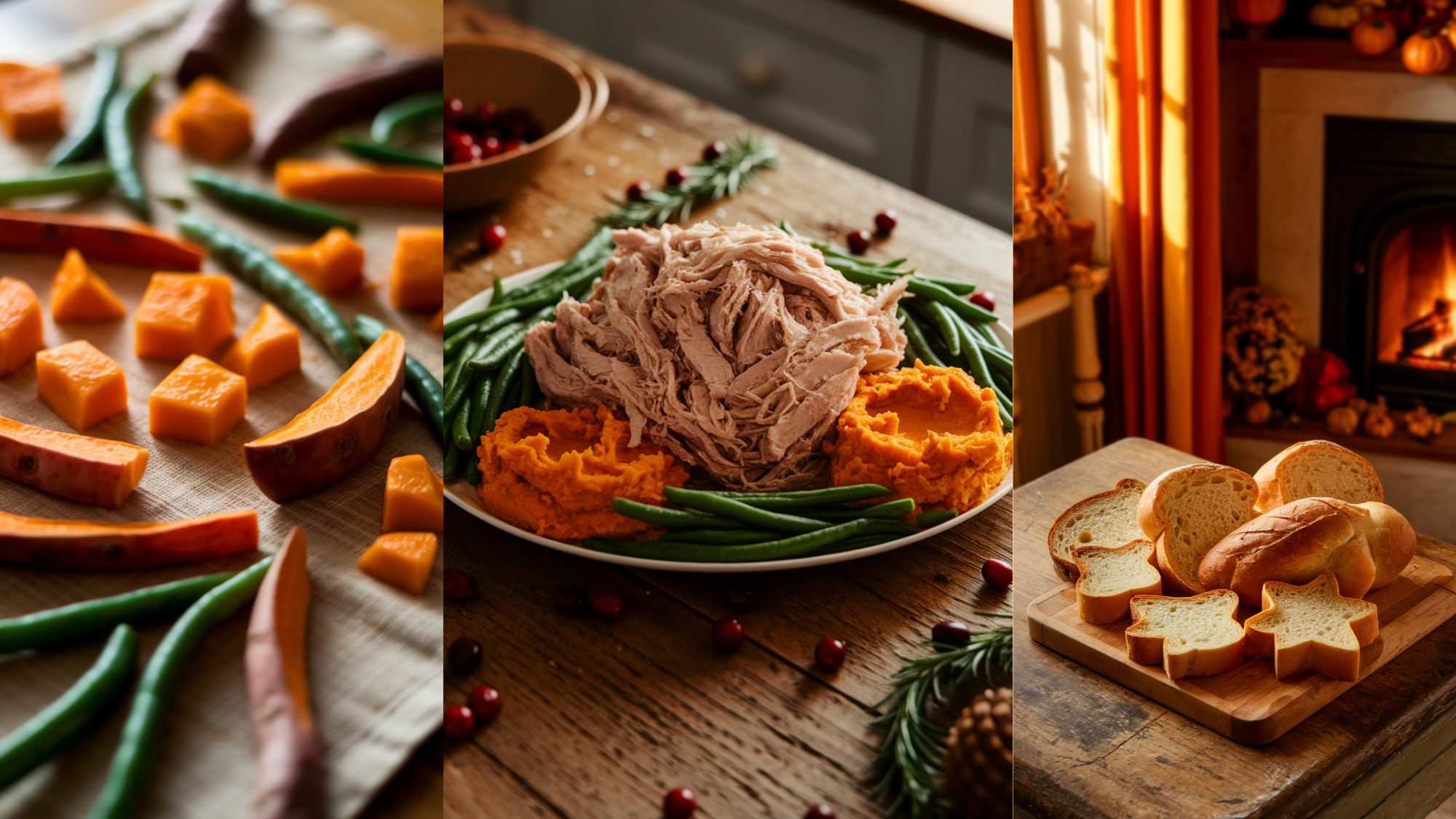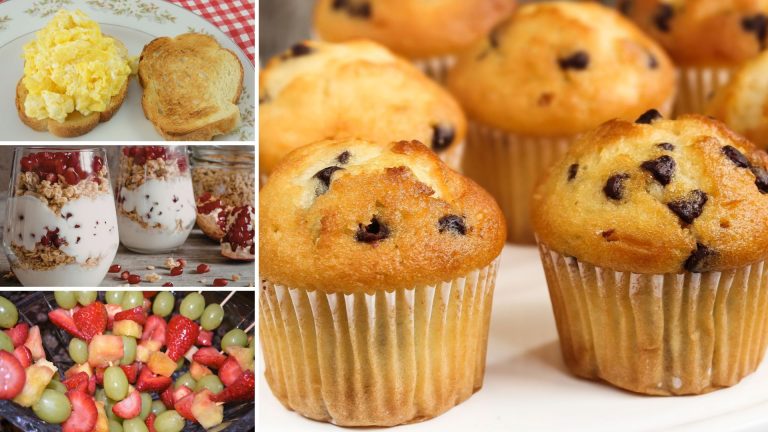7 Thanksgiving Foods Your Baby Will Love and More

Picture this: Your family gathers around the Thanksgiving table, and your baby sits in their high chair, watching everyone enjoy the feast while getting… plain rice cereal. Again.
Most parents with babies face this exact situation during the holidays.
They want their little one to feel included in the family celebration, but traditional Thanksgiving dishes are packed with salt, sugar, and ingredients that aren’t safe for tiny tummies.
The result? The baby gets left out of the festive meal while everyone else enjoys the turkey, sides, and all the holiday favorites.
This guide will show parents exactly which Thanksgiving foods are safe for babies and how to prepare them properly.
What to Keep in Mind When Preparing Thanksgiving Food for Babies
Before planning a baby’s Thanksgiving plate, parents should understand these key safety factors.
1. Baby’s Age and Stage of Eating
Baby’s age determines food preparation methods:
- 6-8 months: Smooth purees and very soft mashed foods only. No chunks or pieces.
- 8-12 months: Soft lumps and small, tender pieces. Can start with finger foods if they are very soft.
- 12+ months: Most soft table foods, cut into appropriate sizes. Avoid hard or round foods.
2. Food Texture Considerations
Match texture to baby’s stage: smooth purees with a baby food consistency work well for new eaters, while experienced beginners can handle soft, mashed foods with tiny lumps.
Soft finger foods that squish easily between fingers are perfect for practicing self-feeding, and older babies can manage small, soft pieces that are still tender enough to gum.
3. Allergies and Choking Hazards to Avoid
Traditional Thanksgiving dishes often include allergens such as dairy, eggs, wheat, and nuts, so avoid introducing new allergens. Choking hazards like whole grapes, nuts, hard candies, and large turkey chunks should be made smaller and softer.
High-sodium foods, such as gravy, stuffing, and casseroles, are also not suitable for babies.
Safe and Tasty Thanksgiving Foods for Babies
Here are the Thanksgiving foods that babies can enjoy!
1. Mashed Potatoes

Is it safe for the baby to eat? Yes, mashed potatoes are perfectly safe for babies as long as they’re made without added salt, butter, or milk. Plain mashed potatoes are actually one of the easiest Thanksgiving foods to share with little ones.
Potential allergens: The main concern is dairy if milk or butter is used in the preparation. If a baby hasn’t been introduced to dairy yet, parents should stick to plain potatoes mashed with a little breast milk or formula.
How to serve babies:
- For younger babies, serve as a very smooth, thin puree.
- Parents can think it out with breast milk, formula, or the cooking water from the potatoes.
- Make sure there are no lumps that could cause choking.
How to serve toddlers:
- Toddlers can handle small, soft chunks of mashed potatoes.
- Parents can even let them practice their pincer grasp by picking up small spoonfuls with their fingers.
2. Roasted Sweet Potatoes or Butternut Squash

Is it safe for the baby to eat? Both sweet potatoes and butternut squash are excellent choices for babies, as long as they’re cooked until completely soft. These foods are naturally sweet and packed with nutrients that babies need.
Potential allergens: Neither sweet potatoes nor butternut squash is a common allergen, making them safe choices for most babies. However, if a baby has shown sensitivity to other orange vegetables, parents should introduce these carefully.
How to serve babies:
- Serve as smooth purees or well-mashed.
- Parents can roast them until very soft, then mash with a fork or puree in a food processor.
- The natural sweetness makes these vegetables appealing to babies.
How to serve toddlers:
- Cut roasted sweet potatoes or squash into small, soft strips or chunks that are easy for little hands to grab.
- Make sure they’re cooked until they squish easily between fingers.
3. Steamed Green Beans or Peas

Is it safe for the baby to eat? Yes, both green beans and peas are safe for babies when they’re steamed until very soft and cut into appropriate sizes. These vegetables add color and nutrition to a baby’s Thanksgiving plate.
Potential allergens: Neither green beans nor peas are common allergens, making them safe choices for most babies.
How to serve babies:
- Cut steamed green beans into small pieces (no longer than half an inch) or mash them slightly.
- For peas, parents can mash them or serve them whole if they’re very soft.
- Always test the softness by gently squeezing it between your fingers first.
How to serve toddlers:
- Toddlers can handle soft, whole green beans or peas as finger foods.
- Cut green beans into pieces about an inch long – perfect for little hands to grasp and easy to chew.
4.Soft Cooked Apples or Pears

Is it safe for the baby to eat? Cooked apples and pears are wonderful for babies because cooking makes them soft and easy to digest. The natural sweetness appeals to babies, and they’re packed with fiber and vitamins.
Potential allergens: Apples and pears are rarely allergenic, making them safe choices for most babies.
How to serve babies:
- Cook until very soft, then mash or puree.
- Parents can cook them with a little water or steam them until they’re tender.
- Remove any peels and make sure there are no hard pieces.
How to serve toddlers:
- Cut soft-cooked apples or pears into small wedges or pieces that toddlers can easily hold and bite.
- The pieces should be soft enough that they won’t pose a choking risk.
5. Pumpkin Puree

Is it safe for the baby to eat? Plain pumpkin puree is absolutely safe for babies and makes a perfect Thanksgiving food. It’s smooth, naturally sweet, and full of vitamins. Just make sure to use plain pumpkin, not pumpkin pie filling.
Potential allergens: Pumpkin is not a common allergen, making it a safe choice for most babies.
How to serve babies:
- Serve as a smooth puree, either alone or mixed with other purees the baby already enjoys.
- Parents can thin it slightly with breast milk or formula if needed.
How to serve toddlers:
- Mix pumpkin puree with soft grains or serve small spoonfuls that toddlers can pick up with their fingers.
- Parents can also offer small, soft chunks of roasted pumpkin if it’s cooked until very tender.
6. Tender Turkey Pieces

Is it safe for the baby to eat? Turkey can be safe for babies as long as it’s thoroughly cooked and prepared properly. The key is making sure it’s tender enough and cut into appropriate sizes.
Potential allergens: Poultry allergies are rare but can occur. If a baby has never had turkey or chicken before, parents should introduce it slowly and watch for any reactions.
How to serve babies:
- Shred the turkey into very small pieces or puree it with a little cooking liquid to make it easier to swallow.
- Make sure there are no bones, cartilage, or tough pieces.
How to serve toddlers:
- Cut tender turkey into small, bite-sized pieces that toddlers can easily pick up and chew.
- Avoid giving them large chunks that could pose a choking risk.
7. Chicken or Turkey Meatballs

Is it safe for the baby to eat? Homemade meatballs made with simple ingredients can be safe for babies, as long as they’re very tender and made without added salt or strong seasonings.
Potential allergens: Watch out for gluten if breadcrumbs are used, and dairy if cheese is added. Parents should stick to simple recipes with just meat and maybe a little egg as a binder.
How to serve babies:
- Break soft meatballs into small pieces or puree them for younger babies.
- Make sure they’re cooked through and tender enough to mash with a fork.
How to serve toddlers:
- Serve small, soft meatballs that toddlers can pick up easily.
- Cut larger meatballs into halves or quarters to prevent choking.
Ideas for Baby-Led Weaning on Thanksgiving

Baby-led weaning can make Thanksgiving extra special for little ones. Here’s how to make it work with holiday foods.
Finger Foods Babies Can Enjoy
These safe options work well for babies practicing self-feeding during the holiday:
Soft-roasted vegetables, such as sweet potato strips, green beans, or butternut squash pieces – soft enough to squish but firm enough to grasp.
Shredded turkey finely pulled with no large pieces, keeping it moist and tender for safe eating.
Soft bread slices are cut into small pieces that dissolve easily, only if the baby has been introduced to gluten.
Simple Ways to Serve Thanksgiving Foods for Baby-Led Weaning
Portion foods into baby fist-sized pieces for safe grasping. Cut foods into stick shapes when possible – sweet potato sticks, soft green bean pieces, and strips of tender turkey work well.
Everything should pass the “squish test” – if parents can’t easily squish it between thumb and forefinger, it’s too hard.
Tips for Making Thanksgiving Meals Baby-Safe
Follow these essential safety strategies to keep babies safe during holiday meals:
- Set aside plain portions before adding salt, sugar, or spices to family dishes.
- Cut everything smaller than expected – baby mouths are tiny.
- Test softness – food should mash easily with the tongue against the roof of the mouth.
- Avoid round foods that could block airways. Cut grapes in half.
- Stay within arm’s reach during meals. Choking happens quickly and silently.
- Keep meals calm – babies need time to try food safely.
Fun Thanksgiving Baby Food Ideas

Make baby’s first Thanksgiving extra special with these serving ideas:
| Food Type | Presentation Ideas | Examples |
|---|---|---|
| Colorful Plates | Use orange, green, and white foods | Sweet potatoes, green beans, mashed potatoes |
| Fun Shapes | Cut into sticks or use cookie cutters | Sweet potato logs, shaped like soft bread |
| Interactive Foods | Foods to squish and poke | Soft mashed textures, finger foods |
| Vegetable Sticks | Soft, colorful finger foods | Sweet potato sticks, green bean pieces, carrot sticks |
| Fruit Purees | Natural sweetness, fall flavors | Pureed pears, pureed apples |
| Simple Mixes | Combine familiar foods | Pumpkin + breast milk, sweet potato + pears |
These simple touches help babies feel included in the family celebration while keeping meals safe and age-appropriate.
Conclusion
Thanksgiving is about bringing families together, and that includes the littlest family member. Parents should focus on plain, soft foods that match their baby’s eating stage, and remember that this is about creating memories, not perfection.
The most important thing is letting babies join the family celebrations is crucial for their safety. Early food experiences build healthy habits and include them in traditions. Sharing the meals, even in their own way, adds meaning to the holiday for all.
Have you tried serving any of these baby-friendly Thanksgiving foods to your little one? Share your experiences in the comments below!
If you’re looking for more festive food ideas, check out our post on 22 Traditional Foods You Must Try for a delightful mix of flavors that everyone will enjoy, including baby-friendly options!






